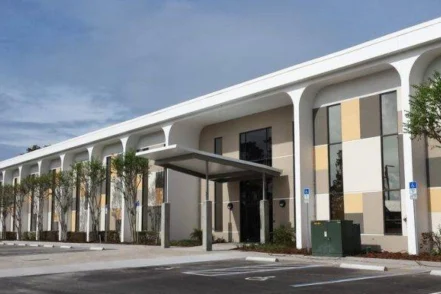About Naval Hospital-Jacksonville
Specialized substance abuse care is provided to military personnel, veterans and their families by Naval Hospital Jacksonville in Jacksonville, Florida. The Substance Abuse Rehabilitation Program (SARP) provides inpatient and outpatient services that are specifically structured to deal with addiction while also meeting the special requirements of military lifestyle.
Technology is an important component of the treatment process. The facility has embraced the Navy Care virtual health services to enhance the availability of treatment to the patients and their families, especially when physical visits are not feasible. The use of MHS GENESIS electronic health records system improves the communication between the providers to eliminate the time lost in seeking care. All the families are expected to be involved in the therapy and support groups to help them gain the right information that will enable them to set up proper boundaries. Parents who are seeking help for their child who is addicted to fentanyl, are afraid of making the wrong decision. They offer information on intervention planning, enabling behaviours and emotional support to help the loved ones make real changes towards recovery. Naval Hospital Jacksonville delivers care to military families with structured treatment, current technology and a solid family support system. They focus on the physical and emotional aspects of the disease and enable patients and their families to gain the resources they need for recovery.Care For Families
Addiction Treatment Programs
Alcohol Rehab
The goal of an alcohol rehab in Florida is to give you the tools and skills you need to achieve long-term recovery. Alcohol rehab may include detox, inpatient treatment, and/or outpatient care. You’ll learn the roots of addiction and learn how to build a substance-free life.
Opioid Addiction
In Florida, rehab provides a combination of therapy and education to help clients overcome opioid addiction. In an opioid treatment program, you’ll not only receive treatment, but you’ll participate in activities, receive peer support, and learn how to have fun without substance use.
Drug Rehab
Drug rehab in Florida helps clients find the motivation to make a change and gives them the tools to achieve long-term sobriety. Drug rehab may include detox, inpatient treatment, and/or outpatient care. You’ll learn the roots of addiction and learn how to build a substance-free life.
Adult Program
An adult program in Florida addresses the recovery needs of clients in this life stage and gives them the tools they need to succeed. An adult program gives you the skills you need to overcome addiction and address the unique challenges of managing your work, relating to your family, raising children, and balancing a variety of other responsibilities
Military Rehab
Offering specialized substance use treatment for military members and veterans, military rehabs in Florida provide an understanding environment to work on recovery. The staff understands that military members experience things civilians couldn’t imagine, and these programs offer personalized treatment that incorporates your physical, mental, and emotional needs.
Men's Rehab
Men’s rehab programs in Florida address the unique needs of men in a safe, gender-specific environment. A men’s program gives you the skills you need to overcome addiction and address challenges such as family relationships, fatherhood, emotional management, and more.
Women's Rehab
A women’s rehab in Florida addresses the unique needs women have and allows them to build relationships in a gender-specific environment. A women’s program gives you the skills you need to overcome addiction and address your unique challenges, such as motherhood, building a career, having healthy relationships, and more.
Young Adult Rehab
Young people need unique support, and a young adult rehab in the state of Florida helps them learn new life skills while overcoming addiction. A young adult program gives you the skills you need to overcome addiction and address the unique challenges of transitioning from the teen years to adulthood.
Insurance Coverage
Private insurance
One of the best ways to pay for rehab in Florida is to use private insurance, which can pay for some or all of the cost. Contact your insurer to get full details, such as what centers are in-network with your plan and what out-of-pocket costs you might be responsible for.
Self-pay options
Using self-pay in Florida to pay for rehab means writing a check, using a medical loan, or having money electronically sent to the treatment center. Be sure to check on the fee structure, which may depend on the level of care.
Financing available
When looking for ways to pay for rehab in Florida, consider asking if financing options are available. Treatment centers may have financing options such as payment plans, grants, or scholarships. You may also decide to get a medical loan to pay for treatment.
Military insurance
One way for military members and veterans to pay for rehab in Florida is to use military insurance. Keep in mind that you’ll save the most using a center that’s in-network with your plan, and you might have out-of-pocket costs such as a deductible or copayment. Contact the insurer for more details.
Levels of Care
- 1
Detox Treatment
Don’t be afraid of detox in Florida. It’s the first step toward building a new life you love. Detox is often medically supervised, helping it be safe and as comfortable as possible. Medical supervision may include FDA-approved medication and other treatments.
- 2
Inpatient Rehab
Inpatient treatment in Florida allows clients to live full-time in the facility while getting the care they need. Some of the elements of inpatient treatment include individual and group counseling, skill-building, relapse prevention, and help with essentials like employment and housing.
- 3
Outpatient Rehab
If you want to attend school or work during rehab, consider outpatient treatment in Florida. You’ll live independently except when you’re attending rehab. Outpatient treatment sessions generally last 60 to 90 minutes and may include discussing a specific issue, sharing wins and challenges, education about specific topics, or developing life skills.
Therapies
Group Therapy
Overcoming substance use is easier if you’re not alone. During group therapy in Florida, you’ll hear others’ perspectives and get the support you need. Group therapy sessions generally last 60 to 90 minutes and may include discussing a specific issue, sharing wins and challenges, education about specific topics, or developing life skills.
Location
Contact Naval Hospital-Jacksonville
Top Drug Rehab Centers in Florida
-
 Florida
FloridaCompassion Behavioral Health
1 Oakwood Blvd, Suite 265 Hollywood, Florida 33020
-
 Florida
FloridaRecovery First Treatment Center Hollywood
4110 Davie Road Extension Hollywood, Florida 33024
-
 Florida
FloridaAdaptive Center Coral Way
2828 Coral Way, Suite 103 Miami, Florida 33145
-
 Florida
FloridaBoca Recovery Center Powerline Road
21301 Powerline Road, Suite 311 Boca Raton, Florida 33433
-
 Florida
FloridaAspire Health Partners Addictions Receiving Facility ARF
712 West Gore Street Orlando, Florida 32805
-
 Florida
FloridaAmbrosia Treatment Center West Palm Beach
222 Picadilly Street West Palm Beach, Florida 33407
-
 Florida
FloridaFellowship House Miami
5711 South Dixie Highway Miami, Florida 33143
-
 Florida
FloridaUnited Recovery Project Hollywood
5900 Johnson Street Hollywood, Florida 33021
-
 Florida
FloridaLakeview Health
1900 Corporate Square Blvd Jacksonville, Florida 32216
-
 Florida
FloridaSummer House Detox Center
13550 Memorial Highway Miami, Florida 33161
-
 Florida
FloridaNew Season Duval County Treatment Center
590 Ellis Rd, Building 4 Jacksonville, Florida 32254
-
 Florida
FloridaComprehensive Psychiatric Center 7th Street
4790 Northwest 7th Street, Suite 102 Miami, Florida 33126
-
 Florida
FloridaBeaches Recovery
390 16th Ave South Jacksonville Beach, Florida 32250
-
 Florida
FloridaOrlando Recovery Center Drug and Alcohol Rehab
6000 Lake Ellenor Drive Orlando, Florida 32809
-
 Florida
FloridaEvolutions Treatment Center Miami Fort Lauderdale
2900W Cypress Creek Road, Suite 2 Fort Lauderdale, Florida 33309
Other Popular Florida Cities
Browse by Florida cities
- Pahokee
- Palatka
- Palm Bay
- Palm Beach
- Palm Beach Gardens
- Palm Beach Shores
- Palm City
- Palm Coast
- Palm Harbor
- Palm Springs
- Palmetto
- Panama City
- Panama City Beach
- Pembroke Pines
- Pensacola
- Perry
- Pinellas Park
- Plant City
- Plantation
- Pompano Beach
- Port Charlotte
- Port Orange
- Port Richey
- Port St. Lucie
- Punta Gorda